Want to attend the course but can’t make it on this date?
Fill in your details below and we’ll notify you when we next present a course in this area:
How to become a snake catcher in South Africa? This is a question which is often asked by members of the public and those interested in becoming certified snake catchers in their local communities.
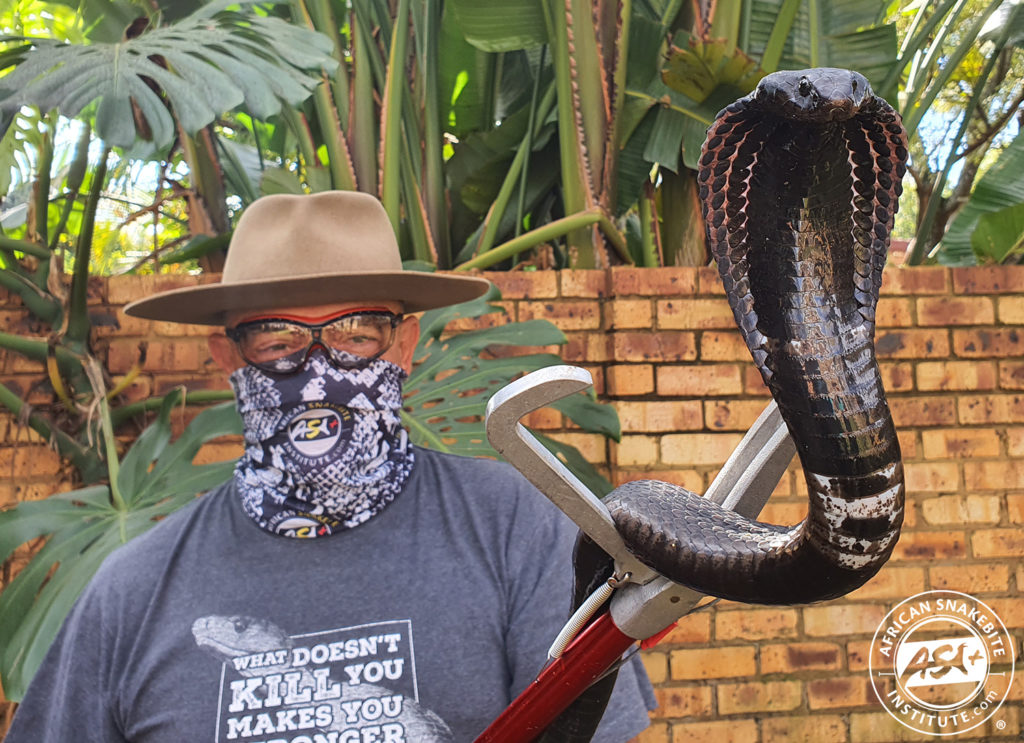
The answer is quite simple, you need to attend a snake awareness, first aid for snakebite and venomous snake handling course. These courses are open to members of the public from all walks of life – be it someone who owns a plot and wants to relocate snakes away from their home, to a game ranger who needs to deal with snakes in chalets, or to an accountant who just has an interest in learning more. The introductory course should cover snake awareness, identification, behaviour, biology, what to do in snake encounters, first aid for snakebite and how to safely capture and release venomous snakes using a range of the correct snake handling equipment (snake hooks, tongs, buckets and tubes)
When picking a training institute to do your course through, make sure they’re reputable and have qualified and experienced trainers. The company should accredited and issue you with a snake awareness, first aid for snakebite and venomous snake handling certificate (these certificates are usually valid for two years and you then need to attend a refresher course). There are a number of fly-by-night people offering snake courses, with no accreditation and who’s trainers have very limited experience in working with snakes. Some even do the full training with rubber snakes, or venomous species like rattle snakes, which don’t occur in Africa.
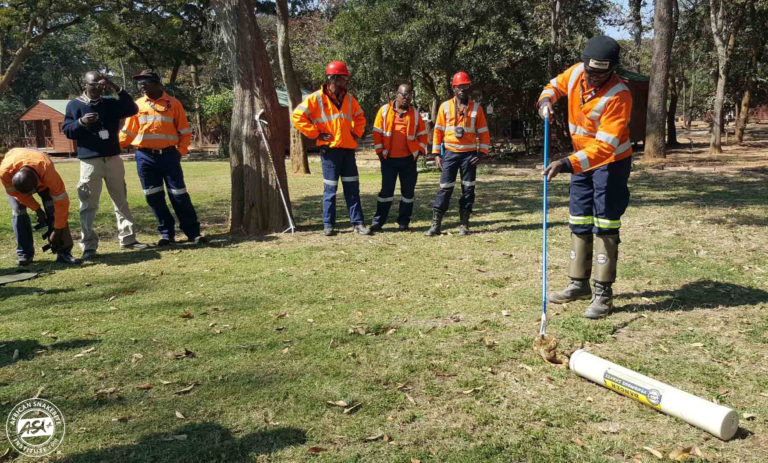
Once you have completed your course, contact the training institute, and ask for their guidance in obtaining your catch and release permits. They will assist by putting you in contact with the correct nature conservation authority who can process your permit application and issue you with a permit to legally catch and release snakes. Once you have obtained your catch and release permits you can get your details added to snake removal list and the ASI Snakes app. Make sure you keep a log of all your catch and releases – this gets submitted to Nature Conservation on an annual basis.
In order to conduct safe removals, you will need to purchase the correct snake handling equipment – we have a great article with guidance on choosing that, which can be found here.
If you are planning on removing snakes regularly or offering snake removal as a service to your local community, it’s wise to attend additional courses, like the Venomous Snake Handling Bootcamp course, the Advanced Venomous Snake Handling Course and an Advanced First aid for Snakebite course.
Another important aspect of snake removal is being able to confidently identify snakes, and you can improve your skills by doing an advanced online snake identification course and by following groups like Snakes of Southern Africa on Facebook.
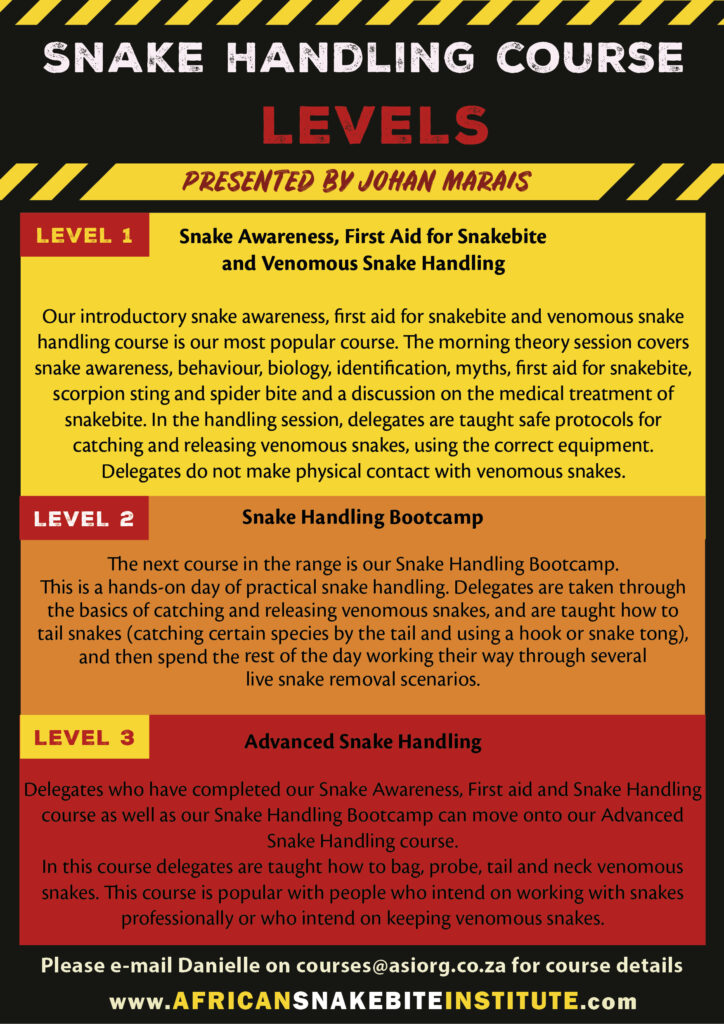
Remember, safety is vital with snake removals – read our Top 10 Guidelines for Safe Snake Removal here.
CONTACT US:
Product enquiries:
Caylen White
+27 60 957 2713
info@asiorg.co.za
Public Courses and Corporate training:
Michelle Pretorius
+27 64 704 7229
courses@asiorg.co.za
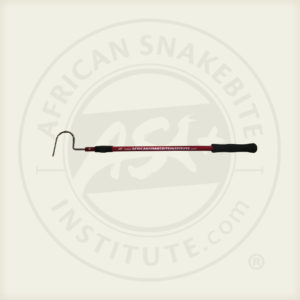 ASI Collapsible Snake Hook - 1.2 m
R650.00
ASI Collapsible Snake Hook - 1.2 m
R650.00
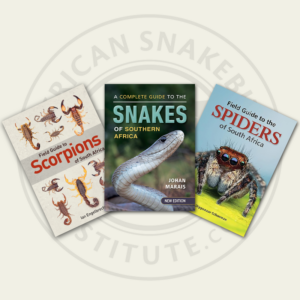 Rangers Book Combo 1
Rangers Book Combo 1
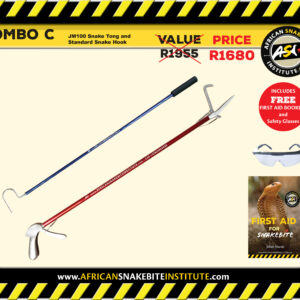 ASI Combo C
R1,680.00
ASI Combo C
R1,680.00
Want to attend the course but can’t make it on this date?
Fill in your details below and we’ll notify you when we next present a course in this area:
Want to attend the course but can’t make it on this date?
Fill in your details below and we’ll notify you when we next present a course in this area:
Want to attend the course but can’t make it on this date?
Fill in your details below and we’ll notify you when we next present a course in this area:
Want to attend the course but can’t make it on this date?
Fill in your details below and we’ll notify you when we next present a course in this area:
Want to attend the course but can’t make it on this date?
Fill in your details below and we’ll notify you when we next present a course in this area:
Want to attend the course but can’t make it on this date?
Fill in your details below and we’ll notify you when we next present a course in this area:
Want to attend the course but can’t make it on this date?
Fill in your details below and we’ll notify you when we next present a course in this area:
Want to attend the course but can’t make it on this date?
Fill in your details below and we’ll notify you when we next present a course in this area:
Want to attend the course but can’t make it on this date?
Fill in your details below and we’ll notify you when we next present a course in this area:
Sign up to have our free monthly newsletter delivered to your inbox:
Before you download this resource, please enter your details:
Before you download this resource, would you like to join our email newsletter list?